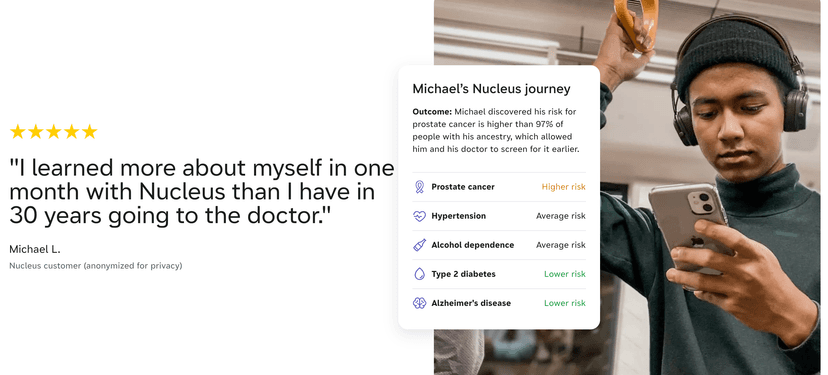Genetics and epigenetics are two important fields that help us understand how our bodies work. While genetics is all about the information we inherit from our parents, epigenetics looks at how our lifestyle and environment can change how these genes are expressed. This article will explore how genes and lifestyle choices interact to shape our health, affect our risk of diseases, and even impact how long we live.
Key Takeaways
- Genetics provides the blueprint for our bodies, but epigenetics can change how these genes are expressed based on lifestyle and environmental factors.
- DNA methylation, histone modification, and non-coding RNA are key mechanisms in epigenetics that influence gene expression.
- Lifestyle choices such as diet, exercise, and avoiding harmful substances can positively affect your epigenetic profile.
- Epigenetic changes can impact the risk of diseases like cancer, type 2 diabetes, and Alzheimer’s disease.
- Making healthy lifestyle choices can help you live longer and improve your overall well-being.
The Basics of Genetics and Epigenetics
Defining Genetics
Genetics is the study of genes and heredity. It explains how traits like eye color, height, and even the risk of certain diseases are passed from parents to their children. Genes are the basic units of heredity and are made up of DNA. They provide the instructions for building and maintaining our bodies.
Understanding Epigenetics
Epigenetics looks at how behaviors and environment can cause changes that affect the way genes work. Unlike genetic changes, epigenetic changes do not alter the DNA sequence but can still affect gene activity. These changes can be influenced by various factors, including diet, stress, and exposure to toxins.
How They Interact
Genetics and epigenetics work together to shape who we are. While our genes provide the blueprint, epigenetic changes can influence how these genes are expressed. This means that even if you have a genetic predisposition to a certain trait or disease, your lifestyle and environment can impact whether or not these genes are activated. This interaction highlights the importance of both inherited traits and external factors in determining our health and characteristics.
Epigenetic Mechanisms and Their Influence
DNA Methylation
DNA methylation is a key epigenetic mechanism where a methyl group is added to DNA, often leading to gene silencing. This process can turn off genes that might otherwise be active. Methylation patterns can change due to environmental factors, affecting how genes are expressed over time.
Histone Modification
Histone modification involves changes to the proteins around which DNA is wrapped. These changes can either tighten or loosen the DNA, impacting gene expression. Common modifications include acetylation and methylation of histones, which can either activate or repress genes.
Non-coding RNA
Non-coding RNAs are RNA molecules that do not code for proteins but play a role in regulating gene expression. They can bind to messenger RNAs or DNA, influencing which genes are turned on or off. This mechanism adds another layer of control over genetic activity.
Epigenetic modifications are dynamic and can change in response to environmental and psychosocial factors. These changes can occur at the level of chromatin, DNA, and RNA, and exhibit high levels of plasticity throughout the human lifespan.
Lifestyle Factors Affecting Epigenetics
Diet and Nutrition
Diet plays a significant role in shaping our epigenetic profile. Nutrients from the food we eat can influence gene expression by adding or removing chemical tags on our DNA. A balanced diet rich in fruits, vegetables, and whole grains can promote healthy gene expression. On the other hand, a diet high in processed foods and sugars can lead to negative epigenetic changes.
Exercise and Physical Activity
Regular physical activity is another crucial factor that affects our epigenetics. Exercise can lead to beneficial epigenetic modifications that improve overall health. It helps in regulating genes associated with metabolism, inflammation, and even aging. Incorporating activities like walking, running, or yoga into your daily routine can have a positive impact on your gene expression.
Smoking and Environmental Toxins
Exposure to harmful substances like tobacco smoke and environmental toxins can lead to adverse epigenetic changes. These changes can increase the risk of developing various diseases, including cancer and respiratory illnesses. Avoiding smoking and minimizing exposure to pollutants can help maintain a healthier epigenetic profile.
By making informed lifestyle choices, individuals can positively influence their epigenetic patterns and promote better health outcomes.
Epigenetics and Disease Susceptibility
Cancer
Epigenetic changes can play a significant role in the development of cancer. Disruptions in epigenetic mechanisms can lead to abnormal gene activation or silencing, which may result in uncontrolled cell growth. For instance, DNA methylation and histone modification are often altered in cancer cells, leading to the activation of oncogenes or the suppression of tumor suppressor genes.
Type 2 Diabetes
Type 2 diabetes is another disease influenced by epigenetic factors. Changes in DNA methylation patterns can affect insulin production and glucose metabolism. These epigenetic modifications can be influenced by lifestyle factors such as diet and physical activity, highlighting the importance of a healthy lifestyle in managing diabetes risk.
Alzheimer’s Disease
Epigenetic mechanisms are also implicated in Alzheimer’s disease. Abnormal DNA methylation and histone modifications can affect the expression of genes involved in brain function and memory. Research is ongoing to understand how these epigenetic changes contribute to the development and progression of Alzheimer’s, with the hope of finding new therapeutic targets.
Understanding the role of epigenetics in disease susceptibility opens new avenues for prevention and treatment. By modifying lifestyle factors, we may be able to influence our epigenetic profile and reduce the risk of certain diseases.
Epigenetics and Longevity
Impact of Early Development
Early development plays a crucial role in shaping our epigenetic profile. The experiences and environment during childhood can leave lasting marks on our genes. These early epigenetic changes can influence how we age and our susceptibility to diseases later in life.
Role of Environmental Factors
Environmental factors such as pollution, stress, and exposure to toxins can alter our epigenetic markers. These changes can either promote healthy aging or increase the risk of age-related diseases. It's essential to be aware of these factors and take steps to minimize their negative impact.
Healthy Aging
Healthy aging is not just about genetics; it's also about maintaining a lifestyle that supports positive epigenetic changes. This includes a balanced diet, regular exercise, and avoiding harmful substances. By making these choices, we can influence our epigenetic profile and promote a longer, healthier life.
Understanding the relationship between epigenetics and longevity can help us make informed decisions to improve our quality of life as we age.
Practical Steps to Influence Your Epigenetic Profile
Adopting a Healthy Diet
A balanced diet rich in fruits, vegetables, whole grains, and lean proteins can positively impact your epigenetic profile. Nutrients like folate, vitamin B12, and polyphenols play a crucial role in DNA methylation and histone modification. Avoiding processed foods and sugars can also help maintain a healthy epigenome.
Regular Physical Activity
Engaging in regular exercise can lead to beneficial epigenetic changes. Activities like walking, running, and strength training can help regulate gene expression related to metabolism and inflammation. Aim for at least 30 minutes of moderate exercise most days of the week.
Avoiding Harmful Substances
Limiting exposure to harmful substances such as tobacco, alcohol, and environmental toxins is essential for a healthy epigenetic profile. These substances can cause negative epigenetic modifications that may increase the risk of diseases.
Remember, your lifestyle choices can have a lasting impact on your genes. By making positive changes, you can influence your health and well-being for the better.
Conclusion
In summary, the study of genetics and epigenetics reveals that while our genes provide a basic blueprint, our lifestyle choices and environment play a significant role in shaping our health. Epigenetics shows us that we are not just bound by our genetic code; we have the power to influence how our genes are expressed. By making healthy choices, such as eating well, exercising, and avoiding harmful habits like smoking, we can positively impact our health and potentially reduce the risk of certain diseases. This understanding empowers us to take control of our well-being, highlighting the importance of both our genetic makeup and the lifestyle we lead.
Frequently Asked Questions
What is the difference between genetics and epigenetics?
Genetics is about the DNA you inherit from your parents. Epigenetics is how your lifestyle and environment can change how your genes work.
Can lifestyle choices really change my genes?
While your genes don't change, lifestyle choices can affect how your genes are expressed. This is what epigenetics is all about.
How does diet impact epigenetics?
What you eat can add or remove chemical tags on your DNA, which can turn genes on or off. Healthy foods can promote good gene expression.
Is exercise important for my epigenetic health?
Yes, regular exercise can have positive effects on your epigenetic profile, which can improve your overall health.
Can bad habits like smoking affect my genes?
Yes, smoking can add harmful chemical tags to your DNA, leading to negative changes in gene expression.
Are epigenetic changes permanent?
Some epigenetic changes can be long-lasting, but many can be reversed if you make healthier lifestyle choices.
























